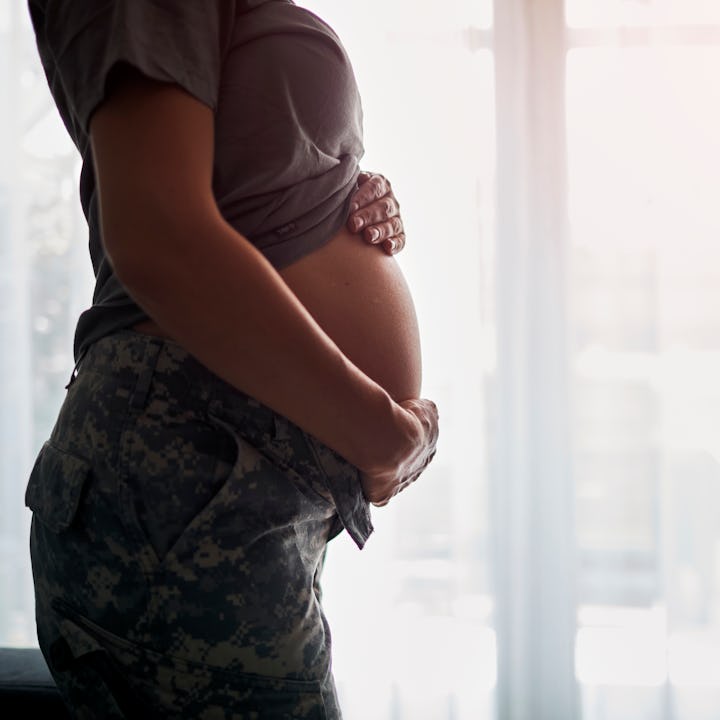These Two Moms Are The Reason The U.S. Army Now Has Better Parental Leave Policies
Two active military moms demanded better family leave — and now 400,000 people in the armed forces have better lives.

The U.S. Army is expanding family leave benefits for its soldiers. Both birth and non-birth parents are included in the updated set of policies, which affect the more than 400,000 parents active across the branch of defense.
On April 19, Secretary of the Army Christine Wormuth sent out a memo to commanders outlining the parental leave and pregnancy policy changes, which were implemented due to “evidence-based health and wellness guidance to improve quality of life, promote flexibility, and enable all Soldiers to safely continue their duties, return to readiness, perform critical assignments, and advance in their careers while growing their families.”
One of these policy changes excuses soldiers who gave birth from continuous duty events that last longer than 24 hours a year after giving birth. This means that soldiers who have given birth will not be deployed or have to do field training (including combat training) and other temporary duties, according to Military.com. This policy also includes other non-birth parents, single soldiers, and soldiers going through fertility treatments.
New policies also grant soldiers who are breastfeeding 30-minute lactation breaks every two to three hours in a room that is not a bathroom or broken down maintenance closet. Instead, breastfeeding soldiers will have access to a room that locks and has a fridge for milk storage.
Several other progressive adjustments, like adding 12 days of paid leave after giving birth and allowing medical leave for pregnancy losses for soldiers and their spouses, have made their way into the Army’s updated parental leave policy.
So what was the catalyst for the a military branch of one of the six countries in the world not to have guaranteed paid leave for new mothers to expand their family leave policies? A group of army moms who banded together to advocate for themselves, naturally.
According to Honolulu Star Advertiser, it was specifically two moms stationed at Schofield Barracks Army Base on the island of O’ahu, Hawaii, that got the ball rolling.
Captain Kelly Boursinos and 1st Lieutenant Meghan Gephart joined a Facebook group called The Army Mom Life a few years back. The group was designed for active military moms to share advice and support on how to balance service and parenthood.
Boursinos had fortunately felt supported by her leaders and peers when she gave birth to her daughter in 2018. However, as she delved into the Facebook group, she quickly learned that not all Army Moms had the same experience.
“There wasn’t a place where moms that are serving in the military can go and connect (as opposed to) spouses who aren’t serving themselves,” Gephart, a mother of two currently enrolled in the Army’s Captains Career Course in Texas, told Star Advertiser.
An unexpected pregnancy in 2018 left Gephart between “a rock and a hard place.” She had to change her initial plans of going to China for a year-long program, and had hoped that she could go back to basic officer training as she carried her baby.
“I was in this hold status where I was sort of stuck and not able to progress forward and do the sort of basic requirements to be able to be validated as a military intelligence officer to go out into the operational Army,” she said.
“What was frustrating to me at the time was the policy was written such that it would allow for accommodations for other types of injuries,” Gephart noted. “But then pregnancy was deemed a totally different category, and you weren’t allowed to attend. That was just a blanket policy.”
Gephart ended up spending most of her son’s first year doing field training in Hawaii, and while she loved the work, she did not like being away from her son and ultimately felt like she had to choose between being a mother and pursuing her career.
Boursinos and Gephart joined forces to put together a data-backed white paper and emailed it to Sgt. Maj. of the Army Michael Grinston after talking to him about the lack of parental support offered by the force in a Twitter Q&A.
A little over a year later, the Army has announced these reforms to parental leave.
Here’s to hoping that more employees push companies and employers follow suit. Or hell, why don’t we just go for federal universal paid leave and not make women prove that they need paid leave after having a baby? No parent should have to choose between their child, their own health and safety, and their career.